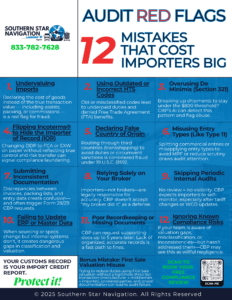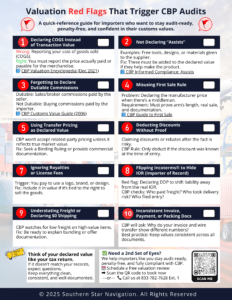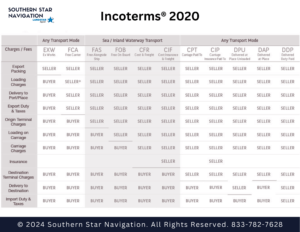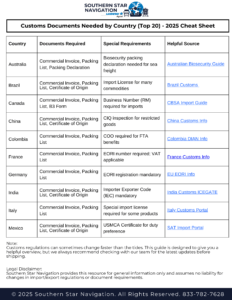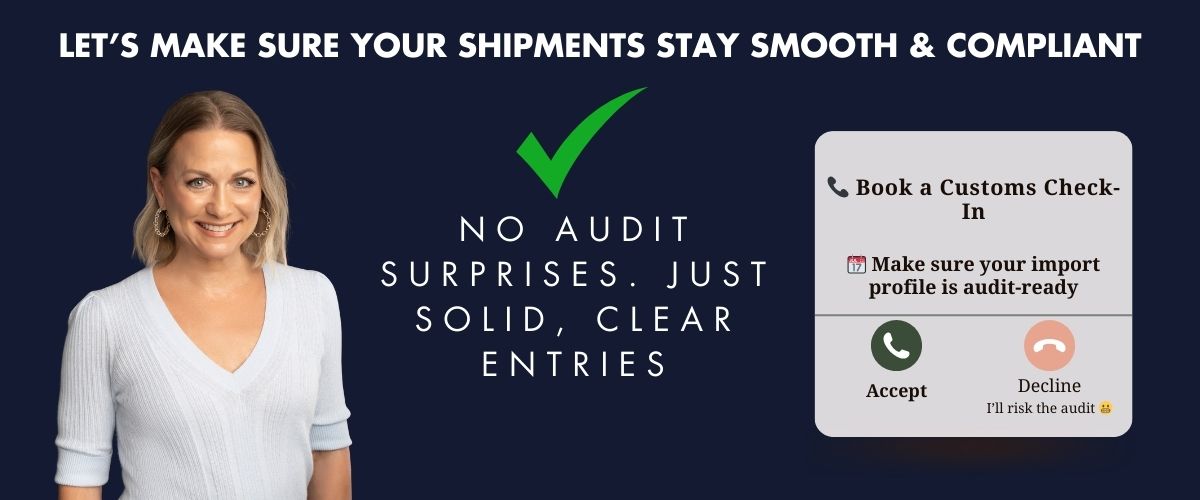CBP Audits Are Heating Up in 2025 and Here’s What You Need to Know
If you’re an importer, you’ve probably already felt it—Customs and Border Protection (CBP) is not playing around this year. Audits are up. Penalties are up. And the pressure to get everything right has never been higher. This isn’t just about fixing a couple of invoices or double-checking an HTS code. This is about protecting your business from serious consequences that could stick with you for years.
At Southern Star Navigation, we’ve seen what happens when companies ignore the warning signs. We also know how to help you avoid the biggest mistakes importers make—the kind that quietly trigger audits, cause shipment delays, or cost you way more than you were trying to save.
Let’s break it all down in plain English and give you the tools to stay protected.
Why CBP is Cracking Down in 2025
CBP uncovered $310 million in owed duties in March 2025 alone. That’s a massive spike from just $2.9 million in February. This didn’t happen by chance. CBP has invested in smarter systems—using AI, cross-platform data, and pattern recognition tools to scan import behavior across ACE, USPS, Amazon, Shopify, and more.
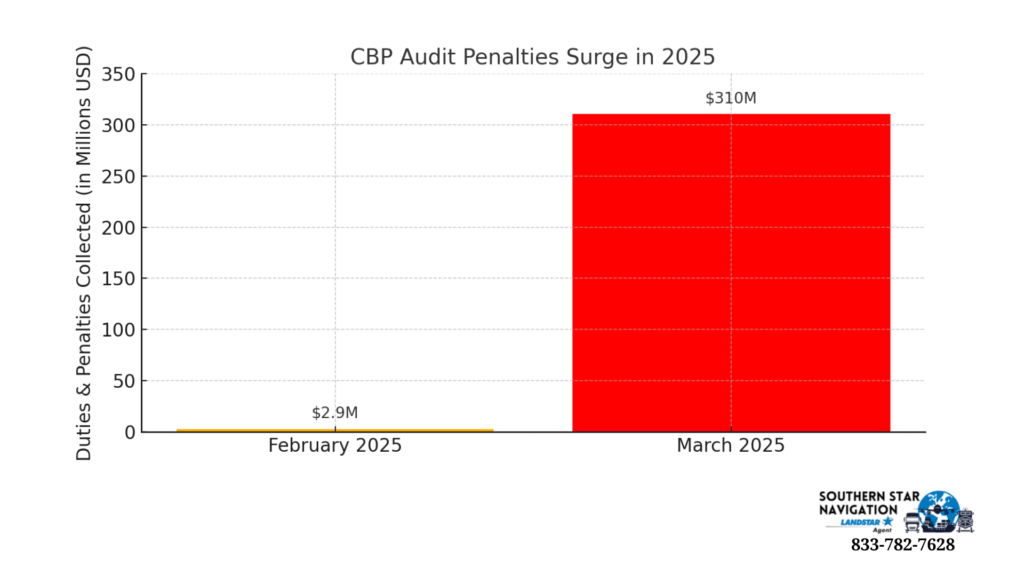
They’re looking for:
- Suspicious values and flipped Incoterms®
- Repeat structuring patterns
- Undervaluation schemes (especially using COGS instead of full transaction value)
- Transshipment fraud (falsifying origin through third countries)
And no—these audits aren’t random. CBP is profiling entries, ranking risk, and following the digital breadcrumbs.
12 Silent Mistakes That Trigger Audits
We put together a free downloadable cheat sheet called “12 Silent Mistakes That Trigger Audits” to help importers catch compliance issues before CBP does.
Here’s a quick preview of just a few:
- Using the wrong HTS code without justification
- Declaring DDP while skipping key compliance requirements
- Forgetting to declare assists (like tooling, samples, molds, or design work)
- Flipping Incoterms® to hide the real Importer of Record (IOR)
- Relying on outdated classification data without periodic reviews
Valuation Red Flags That Can Sink a Shipment
CBP knows that valuation is where most shortcuts happen. That’s why we also created a Valuation Red Flags PDF with the top issues that get flagged:
- Declaring only the COGS (cost of goods sold) instead of full transactional value
- Forgetting to include commissions, royalties, or packing fees
- Misusing the First Sale Rule without proper tiered documentation
The Risk of Flipping Incoterms®
Some logistics providers suggest using Delivered Duty Paid (DDP) to make things easier for the buyer. But that convenience can backfire if it’s not properly documented.
If CBP believes you’re using DDP to hide the true IOR or blur responsibility, you could face:
- Entry suspension
- Form 28/29 requests
- Seizures or penalties under 19 U.S.C. §1592
We’ve heard more and more companies say: “Can’t we just change the Incoterms to make it look like we’re not responsible?”
🚨 Please don’t. CBP is watching.
If you’re using DDP or EXW, you must be able to show:
- Who assumed the risk
- When the risk transferred
- How your documents support your declared terms
We created a free Incoterms® 2020 Guide and a downloadable Cheat Sheet to help with this.
Are You Audit-Ready? 8 Customs KPIs to Watch
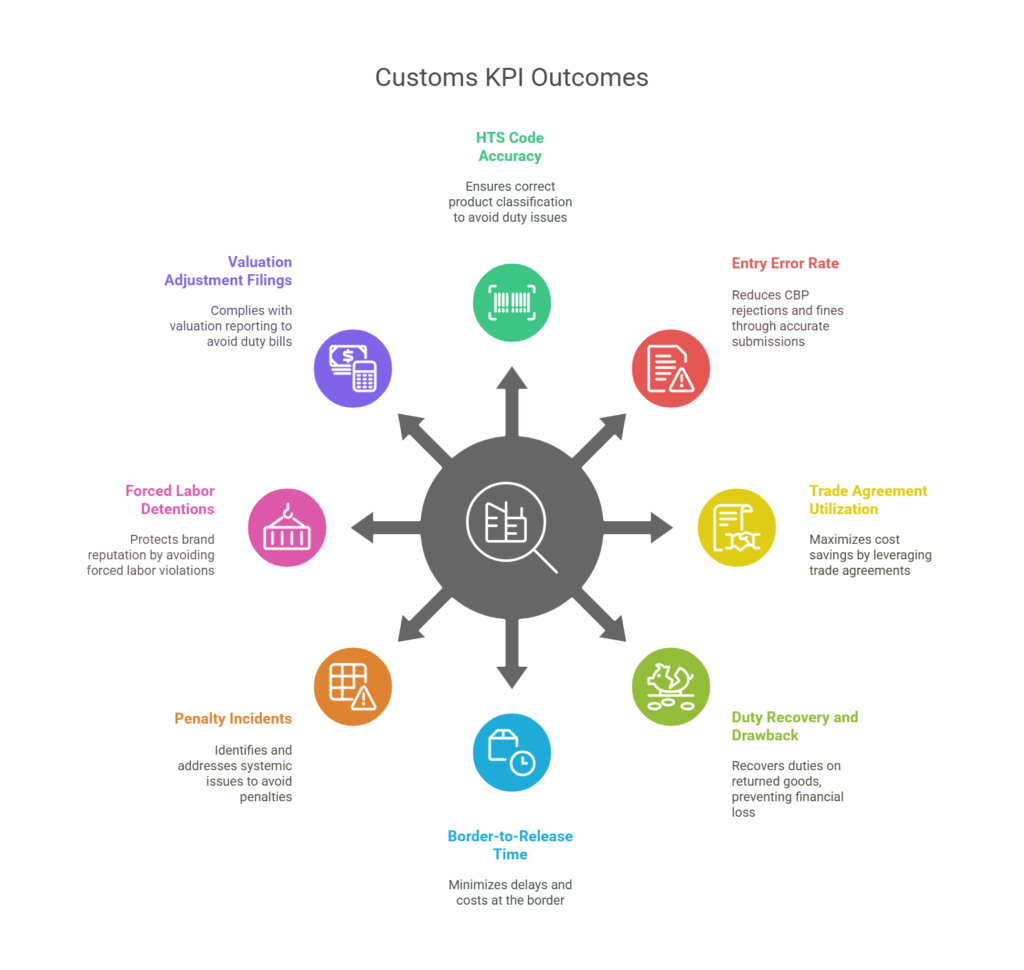
Before Customs flags a shipment or sends a Form 28, there are usually signs — and many of them show up in your data. One of the smartest ways to stay ahead of audits is to track a few key customs KPIs (Key Performance Indicators). These are internal metrics that help you understand whether your import activity is on track or quietly creating risk.
1. HTS Code Accuracy
Are your products classified correctly? Using the wrong HTS code can cause duty overpayment, underpayment, or even seizure. Make sure your classifications are reviewed regularly and supported by documentation or rulings.
2. Entry Error Rate
How many of your entries are submitted with mistakes that result in CBP rejections or corrections? Entry errors can lead to fines, shipment delays, and future audits.
3. Trade Agreement Utilization
If you’re eligible for a Free Trade Agreement (FTA) or preferential duty program, are you actually using it? Tracking how often you apply for these savings can help reduce landed costs and improve competitiveness.
4. Duty Recovery and Drawback
Are you identifying opportunities to recover duties on returned or re-exported goods? Monitoring your recovery activity ensures you’re not leaving money on the table.
5. Border-to-Release Time
How quickly are your shipments cleared after they arrive at the port? Delays at the border can lead to demurrage, increased inventory costs, and unhappy customers.
6. Penalty or Liquidated Damage Incidents
How frequently are you receiving penalty notices or liquidated damages from CBP? A rise in penalties could point to a systemic issue with documentation, classification, or valuation.
7. Forced Labor Detentions
Have any of your products been detained due to forced labor violations? Monitoring this helps protect your brand reputation and avoid major delays.
8. Valuation Adjustment Filings
Are you reporting post-import valuation changes, like royalties or transfer pricing adjustments, within the required timelines? Missing these deadlines can lead to unexpected duty bills and penalties.
Tracking these KPIs gives you a clearer view of where your risks are—and where small changes could make a big difference. It’s not about perfection. It’s about knowing where your exposure lies, and taking action before CBP does.
Why Accurate Customs Documents Matter
Missing or incorrect documents don’t just delay a shipment—they raise red flags.
That’s why we also provide a helpful reference PDF that outlines the most common customs documents required by the top 20 countries.
Make sure you’re not skipping:
- Commercial Invoices
- Packing Lists
- Certificates of Origin
- Country-specific documents
🦈 Think of This Like Your Import Credit Report
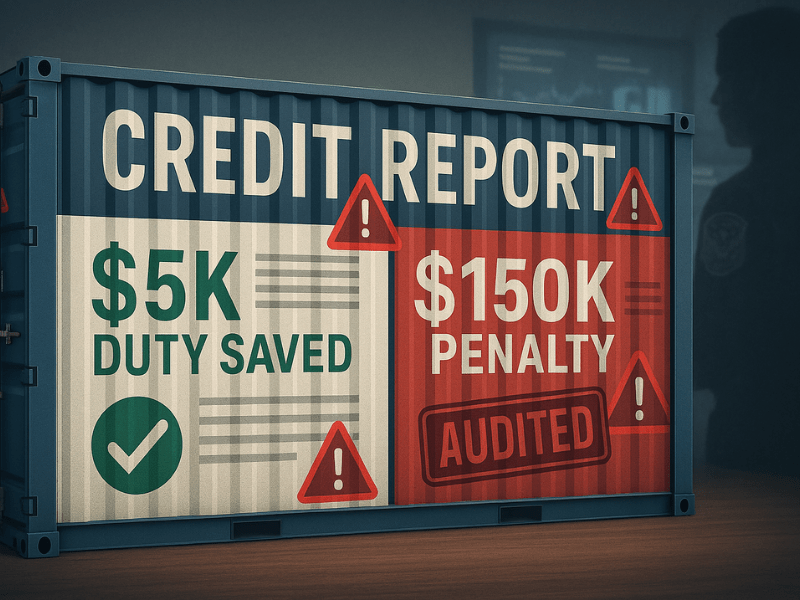
Every single entry you file leaves a digital footprint. It either builds your trust—or raises your risk score.
It’s not about being perfect. It’s about being prepared.
📉 One flipped invoice or fuzzy HTS code might save you $5K.
💥 But it could trigger a $150K penalty, seizure of goods, and years of extra scrutiny.
Just like your credit report, your import record can either help you grow—or hold you back.
✅ We’re Here to Help
We offer customs brokerage services, international shipping, and compliance strategy.
📞 Call 833-782-7628 Ext. 1
📅 Schedule a free compliance review
Let’s protect your business and your reputation—together.


